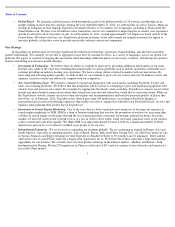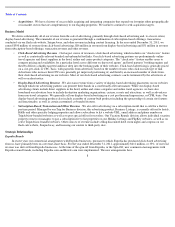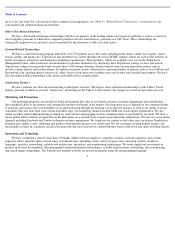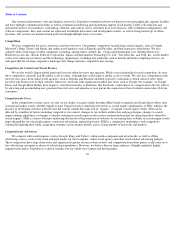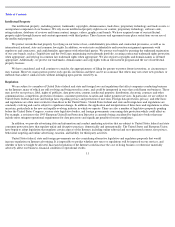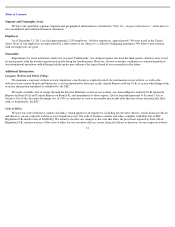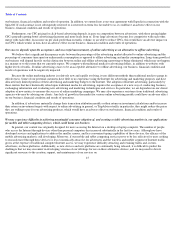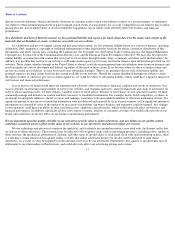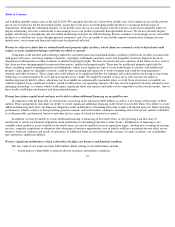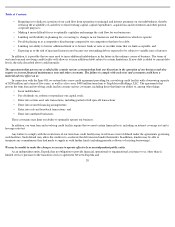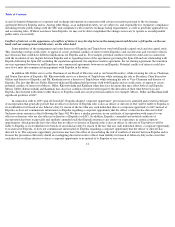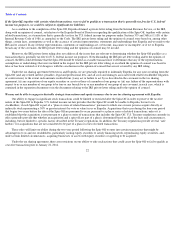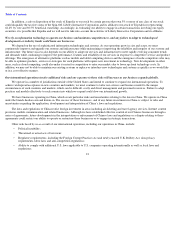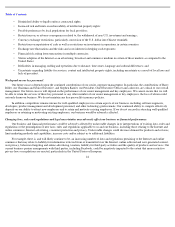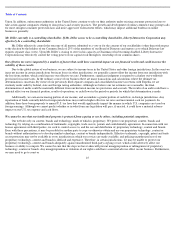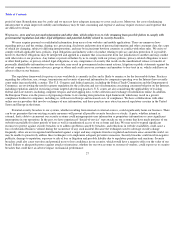TripAdvisor 2011 Annual Report Download - page 21
Download and view the complete annual report
Please find page 21 of the 2011 TripAdvisor annual report below. You can navigate through the pages in the report by either clicking on the pages listed below, or by using the keyword search tool below to find specific information within the annual report.
Table of Contents
directly to travel customers, which could lead to diversion of customer traffic to their own websites or those of a favored partner, or undermine
our ability to obtain prominent placement in paid or unpaid search results at a reasonable cost, or at all. Competition in our industry may result in
pricing pressure, loss of market share or decreased member engagement, any of which could adversely affect our business and financial
performance.
As a distributor and host of Internet content, we face potential liability and expense for legal claims based on the nature and content of the
materials that we distribute or create, or that are accessible via our websites.
As a distributor and host of original content and user-generated content, we face potential liability based on a variety of theories, including
defamation, libel, negligence, copyright or trademark infringement or other legal theories based on the nature, creation or distribution of this
information, and under various laws, including the Lanham Act, the Copyright Act, the Federal Trade Commission Act, the Digital Millennium
Copyright Act, Section 230 of the Communications Decency Act, and the European Union E-Commerce Directive. We may also be exposed to
similar liability in connection with content that users post to our websites through forums, blogs, comments, and other social media features. In
addition, it is possible that visitors to our websites could make claims against us for losses incurred in reliance upon information provided via our
websites. These claims, whether brought in the United States or abroad, could divert management time and attention away from our business and
result in significant costs to investigate and defend, regardless of the merit of these claims. If we become subject to these or similar claims and
are not successful in our defense, we may be forced to pay substantial damages. There is no guarantee that we will avoid future liability and
potential expenses for legal claims based on the content available on our websites. Should the content distributed through our websites violate
the rights of others or otherwise give rise to claims against us, we could be subject to substantial liability, which could have a negative impact on
our business and financial performance.
Loss of trust in our brand would harm our reputation and adversely affect our business, financial condition and results of operations. Our
success depends on attracting a large number of users to our websites, and retaining such users, and providing leads and clicks to advertisers. In
order to attract and retain users, we must remain a valuable source of travel advice. Because of our reliance on user-generated content, we must
continually manage and monitor our content and detect incorrect or fraudulent information. For example, hotels, hotel competitors, or others, in
an attempt to improperly influence a hotel’s reviews and rankings, sometimes write and submit fraudulent or otherwise misleading reviews. If a
significant amount of inaccurate or fraudulent information were not detected and removed by us in a timely manner, or if a significant amount of
information was deemed by users or the media to be inaccurate or fraudulent, our brand, business and reputation could be harmed. Any damage
to our reputation could harm our ability to attract and retain users, employees and advertisers, which would adversely affect our business and
financial performance. In addition, significant adverse news reports or media, industry or consumer coverage of us would reflect poorly on our
brands and could have an adverse effect on our business and financial performance.
We are dependent upon the quality of traffic in our network to provide value to online advertisers, and any failure in our quality control
could have a material adverse effect on the value of our websites to our advertisers and adversely affect our revenue.
We use technology and processes to monitor the quality of, and to identify any anomalous metrics associated with, the Internet traffic that
we deliver to online advertisers. These metrics may be indicative of low quality clicks such as non-human processes, including robots, spiders or
other software; the mechanical automation of clicking; and other types of invalid clicks or click fraud. Even with such monitoring in place, there
is a risk that a certain amount of low-quality traffic, or traffic that online advertisers deem to be invalid, will be delivered to such online
advertisers. As a result, we may be required to credit amounts owed to us by our advertisers. Furthermore, low-quality or invalid traffic may be
detrimental to our relationships with advertisers, and could adversely affect our advertising pricing and revenue.
17


